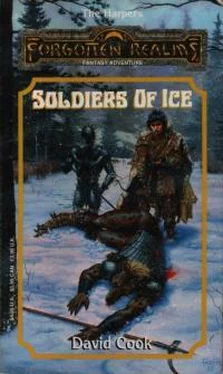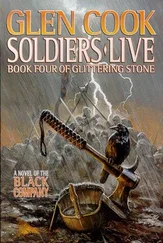David Cook - Soldiers of Ice
Здесь есть возможность читать онлайн «David Cook - Soldiers of Ice» весь текст электронной книги совершенно бесплатно (целиком полную версию без сокращений). В некоторых случаях можно слушать аудио, скачать через торрент в формате fb2 и присутствует краткое содержание. Жанр: Фэнтези, на английском языке. Описание произведения, (предисловие) а так же отзывы посетителей доступны на портале библиотеки ЛибКат.
- Название:Soldiers of Ice
- Автор:
- Жанр:
- Год:неизвестен
- ISBN:нет данных
- Рейтинг книги:5 / 5. Голосов: 1
-
Избранное:Добавить в избранное
- Отзывы:
-
Ваша оценка:
- 100
- 1
- 2
- 3
- 4
- 5
Soldiers of Ice: краткое содержание, описание и аннотация
Предлагаем к чтению аннотацию, описание, краткое содержание или предисловие (зависит от того, что написал сам автор книги «Soldiers of Ice»). Если вы не нашли необходимую информацию о книге — напишите в комментариях, мы постараемся отыскать её.
Soldiers of Ice — читать онлайн бесплатно полную книгу (весь текст) целиком
Ниже представлен текст книги, разбитый по страницам. Система сохранения места последней прочитанной страницы, позволяет с удобством читать онлайн бесплатно книгу «Soldiers of Ice», без необходимости каждый раз заново искать на чём Вы остановились. Поставьте закладку, и сможете в любой момент перейти на страницу, на которой закончили чтение.
Интервал:
Закладка:
Here inside the warren, the hall was filled with light from a pair of wall sconces that held carved wands glowing with magical light. While Tikkanen clicked the door bolts into place, the humans brushed the snow from their leggings. Eventually the ancient doorkeeper shuffled past to lead them down the corridor into the heart of the underground warren.
This was Martine’s first visit to a home of the little folk. She had never been inside the dwellings of either dwarf or gnome, so she was fascinated by every detail. She had expected to see stonework and dank moss like a dungeon or cellar, or wooden beams like a mine, but not the bright wood paneling that covered the walls, ceilings, and floors. Far from dank and dark, it was bright and warm, with an airiness that Martine found welcome, for she had never been fond of the constricting quarters of eaves.
Their path led them through another set of doors. These were intricately carved with stylized patterns of birds, trees, and entwined vines. This third door sealed in the warren’s humid warmth, and beyond it they smelled the rich scents of pine, varnish, caraway, and baking ovens. As before, the way continued to be lit by magical sconces. Their route twisted deeper, past intersections and other doors embellished with carvers’ art, until at last Tikkanen ushered the pair into a small room, undoubtedly large by gnome standards. In the center of one wall stood a door studded with brass medallions.
“The council is inside. You must wait for them to summon you,” the doorkeeper explained before leaving. Apparently used to this arrangement, Vil settled into one of the high-backed benches against the wall. Carved for gnomes, the seat wasn’t more than a footstool to the lanky human. “Sit,” Vilheim suggested.
“I think I’ll stand.” Martine couldn’t look at the man; trying to maintain his dignity while his knees were tucked up practically under his chin, without feeling the urge to laugh. “It could be a long wait,” her companion cautioned.
Martine regained her composure by feigning great interest in the bare chamber. “I’ve been still too long.”
Vil was right. The wait quickly became interminable. Bored, Martine eventually perched awkwardly on another bench, idly flipping the little silver knife Jazrac had given her. “What do you suppose is taking them so long?” she muttered.
“They’re gnomes,” Vil answered coolly. Thinking he’d been asleep, Martine jumped at the man’s voice. The blade slipped between her fingers and stuck into the floor next to her boot with a quivering thunk . “The Vani have their own sense of time. You’d better get used to it. I’ve never seen anything hurry them,” he mumbled drowsily.
“They can’t have that much to do. It’s only a little valley.”
“The Vani have their own sense of what is important,” commented Vil, making idle talk as he shifted his legs to a more comfortable position. “They are important. This valley is important. I doubt anything else is. Certainly you and I rank low in their priorities. The elders are probably inside having birch-bark tea while they try to decide the fair price of a goose that was accidentally killed, or something like that. It’s the right way to do things as far as they are concerned.”
None of this sounded particularly encouraging. It galled Martine to be stalled so close to her goal, even though she knew a few hours, even a day or two, would make little difference. It’s the same old me, wanting everything to go just perfectly , she reminded herself. I just need to relax . Trying to keep that thought in mind, she sank back into the seat. The time stretched on and on, although the boredom was occasionally broken by visits from passing gnomes. A few even stopped long enough to give Vil an awkward greeting. They spoke with such thick accents, their r’s heavily rolled and their vowels sharply clipped, that it was almost impossible for Martine to understand them, but Vil apparently did not have any trouble. He carefully responded to each by name, occasionally asking about the health of a wife or child.
Several times Martine caught glimpses of little gnome housewives with blond-brown hair bound up in a bun. Two of them peered into the room for a peek at the human woman. After a brief look, they stepped out of sight to gossip and cluck in whispered voices. Martine decided not to disrupt their women’s game and kept her eyes almost closed, feigning sleep. If they weren’t so short and broad , Martine decided, they would be like housewives everywhere . Here they dressed in red and blue dresses and embroidered white aprons: In other lands, the clothes might be different, but the gossipy curiosity was unchanged.
Sometimes children, more honest in their curiosity, accompanied the women. They stood staring long after their mothers stepped away in embarrassment. Martine noticed that Vil generated no such attention. Perhaps he was a familiar guest and therefore not worthy of note. “I must be pretty unusual, eh?” she finally said to Vil. She was growing tired of watching others watch her.
The man yawned and nodded. “Well,” he finally allowed, “they’ve seen humans before me, mainly but you’re the first human woman and, by their standards, not a particularly ladylike one.”
“Thank you!”
“I meant ladylike in their eyes. Fighting is a man’s job among the Vani. Women raise the children and rule the home. Men hunt, farm, and deal with outsiders. You’re different. You go against their expectations.”
“The council’s in for a big surprise, then.” Gods know what they might think if they learned I’m a Harper, too . The thought became the flicker of a mischievous grin on her face.
“I guess they know already,” Vil commented as he stretched his cramped legs yet another time.
At last the brass-bound council door swung open. Standing in the doorway were two gnomes in blue robes girdled with sashes embroidered in red and green. Both were young gnomes, hardly elders, Martine noted. The first had close cropped, curly black hair and a contrasting full beard. “The other looked a little younger and had more belly on him: his face didn’t look as weather-beaten, either. His hair and beard were both black, long, and braided, the tips of his chin braids just brushing his chest.
Vil rose to meet the gnomes. “Greetings, Jouka Tunkelo,” he said to the leaner of the two. “And to you Turi Tunkelo.”
“Greetings to you,” the short-haired Jouka answered with a curtness that discouraged further conversation. “The council invites you to come inside.” As she followed the gnomes into the chamber, Martine wondered whether the last was said with disapproval or whether it was just colored by his dour accent.
The council chamber was a small amphitheater, square in shape and higher-ceilinged than the other room. The spacious height was necessary to accommodate three tiers of benches on three sides of the hall. A scattering of gnomes, all of them old, wrinkled gentlemen, sat in every posture on the seats. One, bent with age, leaned forward on a gnarled cane until his long white beard brushed the floor. Another seemed to doze, his bald head wobbling sleepily as he leaned back against the next tier. Others sat clustered in little clumps, serious little bearded men sipping at cups of tea. Judging by their beards, not a one of them, discounting the two ushers, did Martine guess to be less than a great-grandfather. At the same time, she knew the appearance was deceptive, for gnomes had life spans of two hundred or more years. These might be great-great-great grandfathers, for all she knew.
At the very center of the benches, in a seat of obvious authority, sat a most singularly dressed elder. While the others wore pants and jackets of linens and wool, the old gnome in the high seat wore a knee-length tunic of buckskin. This alone was not singular; several other gnomes wore items of buckskin, Martine noted. What made it notable was that the elder’s tunic was festooned with iron charms that hung from leather thongs, so many that the gnome clinked and rattled with every move. The charms, which seemed to be mostly crude sigils and icons, swayed against his stout chest, sometimes tangling themselves into his curly white beard. His thick silver hair was carefully held in place with a birchbark cap, more ornamental than functional. From his dress and the position of his chair, Martine figured the gnome to be the warren’s priest, although of what god she could not possibly say.
Читать дальшеИнтервал:
Закладка:
Похожие книги на «Soldiers of Ice»
Представляем Вашему вниманию похожие книги на «Soldiers of Ice» списком для выбора. Мы отобрали схожую по названию и смыслу литературу в надежде предоставить читателям больше вариантов отыскать новые, интересные, ещё непрочитанные произведения.
Обсуждение, отзывы о книге «Soldiers of Ice» и просто собственные мнения читателей. Оставьте ваши комментарии, напишите, что Вы думаете о произведении, его смысле или главных героях. Укажите что конкретно понравилось, а что нет, и почему Вы так считаете.











